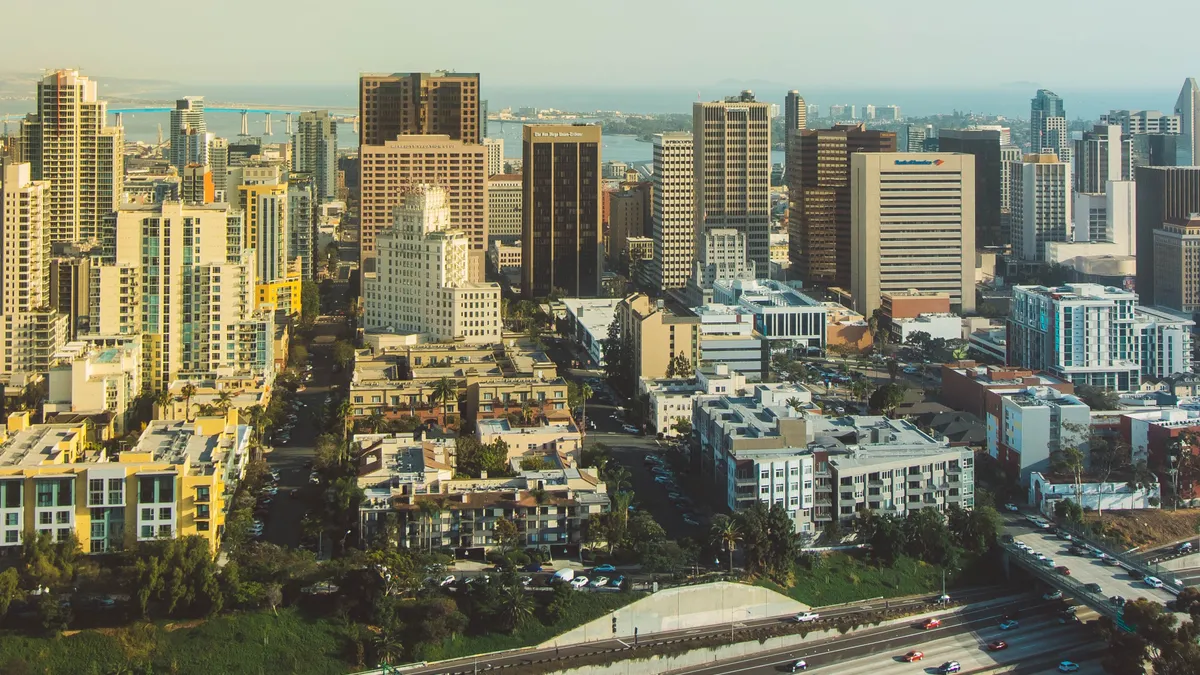Dive Brief:
- San Diego will become the largest city to embrace the community choice aggregation (CCA) model, after officials announced on Thursday plans to develop a joint powers authority (JPA) to pursue 100% renewable energy by 2035, a decade ahead of its original goal.
- San Diego's decision comes just weeks after California regulators raised costs on CCA programs and direct access customers in a move aimed at avoiding cost shifts that may arise when consumers switch electricity providers.
- SDG&E said it "respects" the city's decision and will "help enable the transition," in a statement. The utility will continue to deliver the power, regardless of changes in supplier, and noted the recent adjustments to the Power Charge Indifference Adjustment (PCIA) "minimize the potential for unlawful cost shifts."
Dive Insight:
After three years of debate and research, San Diego officials yesterday revealed they believed a CCA is the best route to using all renewable energy. The decision comes not long after the California Public Utilities Commission (CPUC) raised the PCIA, which could help turn the issue from a contentious debate to a more deliberate process.
Incumbent utility SDG&E has said it will support the city's decision, but at least one group called the Clean Air Coalition (CAC), has opposed the idea for months.
According to a statement from Mayor Kevin Faulconer, however, the new energy supply entity would "create healthy competition," lower energy costs by at least 5% or more for ratepayers, and help the city reach its goal 10 years ahead of schedule.
Faulconer will now seek approval from the San Diego City Council for a resolution of intent to establish a JPA that would implement and operate the aggregation. The resolution is also expected to "allow other cities and government agencies in the San Diego region to join," the mayor's office said. "A regional approach would allow for greater negotiating and buying power as well as create efficiencies in operations and service."
According to city officials, there are other regional cities exploring the feasibility of a CCA that expressed interest in joining with a JPA. San Diego previously conducted a CCA feasibility study in 2017, concluding the aggregation program would be financially feasible.
"This gives consumers a real choice, lowers energy costs for all San Diegans, and keeps our city on the cutting edge of environmental protection," Faulconer said.
Higher PCIA costs are a "step in the right direction, but if the city of San Diego decides to get into the energy business this decision means ratepayers in National City, Chula Vista, Carlsbad, Imperial Beach, La Mesa, El Cajon, and all other neighboring communities would see higher energy bills, and San Diego taxpayers would be faced with mounting debt," said the Clean Air Coalition earlier this month.
On the other side, the California Community Choice Association applauded San Diego's decision to use community aggregation as "the preferred pathway to reach the city’s 100 percent renewable energy goal."
According to the group, there are are 19 CCA programs operating successfully throughout California right now.
The city's utility said it "does not anticipate any material impact to its financial results from the City’s decision to adopt a CCA program and implement it in the next few years." SDG&E, by law, does not profit from the sale of energy that it has purchased for its customers, in theory making it indifferent to defections.
"The cost of energy contracts is a pure pass-through cost to customers with no markup allowed," the utility said. Recent PCIA adjustments "minimize the potential for unlawful cost shifts related to past clean energy and systemwide reliability investments that have benefited and continue to support everyone."
Creation of San Diego's CCA will not be a short process the city warned. Following creation of a JPA and appointment of its board of directors in 2019, the city said the board would then hire an executive leadership team, "which would guide the JPA through the CCA implementation process."
The JPA would then seek CPUC approval, allowing the CCA to begin delivering clean energy by 2021.















